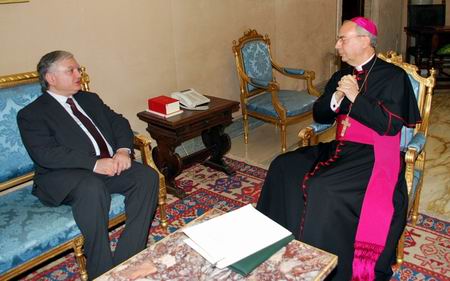Foreign Minister of Armenia visits Italy
24 November, 2009Armenian-Italian legal-contractual field have been enlarged
On 23 November, Armenia’s Foreign Minister Edward Nalbandian paid a short working visit to Italy.
In Rome Foreign Minister Edward Nalbandian had a meeting with Italian Foreign Minister Franco Frattini.Minister Nalbandian thanked his Italian counterpart for the invitation to visit Rome and noted that Armenian-Italian relations had centuies – old history that is marked by good traditions and mutual friendship. By Minister’s definition Armenian-Italian relations had got new impetus after Armenia’s independence and it creates a strong basis for the further strengthening and deepening of relations.
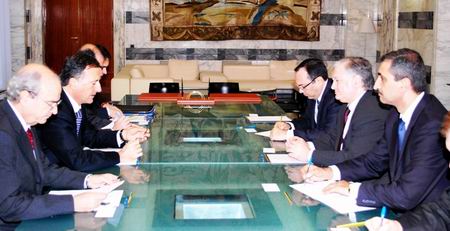
Italy’s Foreign Minister said that his country is interested in developing a comprehensive cooperation between the two countries and is ready to undertake practical steps in this direction.
Ministers Nalbandian and Frattini had thorough talks on the ways of enhancement of bilateral cooperation in different areas, on fostering close cooperation within the frameworks of European structures and international organizations, as well as exchanged views on the international agenda and regional issues.
During the negotiations different directions of cooperation between Armenia and EU, the steps to be undertaken for promoting bilateral cooperation within the frameworks of European Neighborhood Policy and Eastern Partnership Program were also discussed.
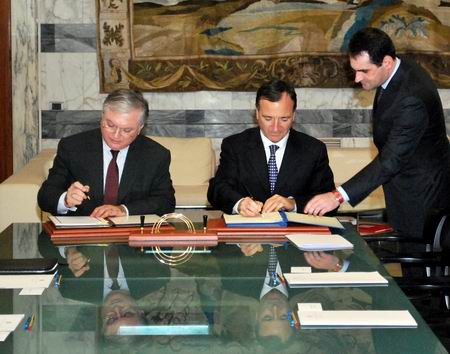
Minister Frattini welcomed and expressed Italy’s support for the steps taken for the normalization of Armenian-Turkish relations. In this regard, he noted that the signing of the Armenian-Turkish Protocols had been acknowledged with great satisfaction in Italy and expressed hope that the documents will be rapidly, which will give a possibility to open the common border.
The heads of Foreign Offices of Armenia and Italy emphasized the necessity of high-level reciprocal visits and promotion of political dialogue. In that context, Ministers attached importance to the signing of Memorandum of understanding on high-level political consultations, underling that its implementation could contribute to intensification of political dialogue. The also touched upon the cooperation in the field of preparation of diplomatic personnel.
Ministers Nalbandian and Frattini discussed the possibility of the visa facilitation between Armenia and European Union, mentioning that it will promote the intensification of people-to-people contacts.
The sides noted with satisfaction that there is a solid legal field for the expansion economic cooperation, as well as trends of intensification economic interaction between the two countries: Italian investments in Armenia considerably increased in 2009.
The possibility of mutual visits of officials of economic bloc of two countries, establishment of decentralized cooperation and organization of Armenian-Italian business forums were also discussed. The Ministers shared the view that the existence of direct flights will stimulate development of tourism and other areas of cooperation.
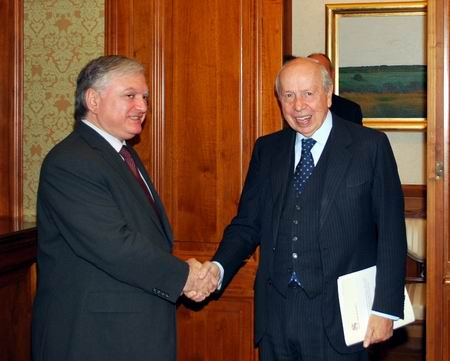
Edward Nalbandian and Franco Frattini highly appreciated cooperation established within the framework of the Agreement on the cooperation between Armenia and Italy in the cultural, educational, scientific and technical areas, as well as cultural and educational exchanges. They underscored that it creates new possibilities for the further deepening of mutual cooperation in humanitarian field.
On the request of his counterpart, Minister Nalbandian presented the recent developments in the negotiation process for the settlement of Artsakh (Nagorno Karabakh) issue and the results of the meeting between the Presidents of Armenia and Azerbaijan held the previous day in Munich.
While accepting Armenia’s Foreign Minister’s invitation to visit Yerevan, Italian Foreign Minister assured that he will visit Armenia in the first part of 2010.
Before the meeting, Ministers signed the Memorandum of Understanding on the high-level political consultations between the Foreign Ministries of Armenia and Italy and the Agreement on the economic cooperation between the governments of Republic of Armenia and the Republic of Italy.
On the same day, head of Armenian Foreign Minister visited Italian Senate, where he had a meeting with Chairman of Committee on Foreign Relations, Italy’s former Prime Minister Lamberto Dini. Issues related to the development of Armenian-Italian relations, cooperation between the Parliaments of two countries were discussed. The two exchanged views on number of regional and international issues.
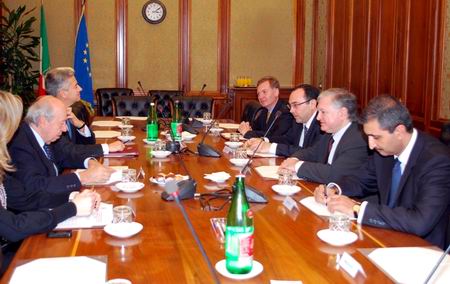
Edward Nalbandian and Lamberto Dini touched upon the Armenian-Italian cooperation in both bilateral and multilateral formats within the frameworks of international organizations and parliamentary assemblies. They also stressed the importance of intensifying of Friendship Groups’ activities formed in both Parliaments.
Minister Nalbandian gave a lecture on Armenia’s foreign policy at the Senate that had been organized by the Italian Organization for the International Relations and Italian- Armenian Inter - Parliamentary Friendship Group. Among 200 participants were senators, members of Italian Parliament, Ambassadors, diplomats, scholars, experts and students.
In his speech Minister Nalbandian touched upon the Armenian-Italian historical relations, partnership between the two countries and possibilities of their development, Armenia-EU cooperation, problems in South Caucasus and presented the Armenia’s vision on the their solution. Armenia’s Foreign Minister also answered to the questions of participants.
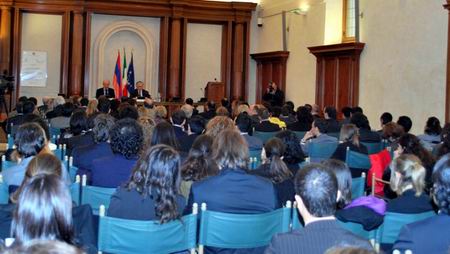
During his stay in Rome, the head of Armenia’s Foreign Office also visited Vatican where he met Archbishop Dominique Mamberti, the Secretary for the Holly See’s Relations with States.
The sides appriciated high-level relations between Armenia and Vatican, as well as between Armenian Apostolic and Roman Catholic Churches, and expressed confidence that they will be further strengthened by the mutual efforts.
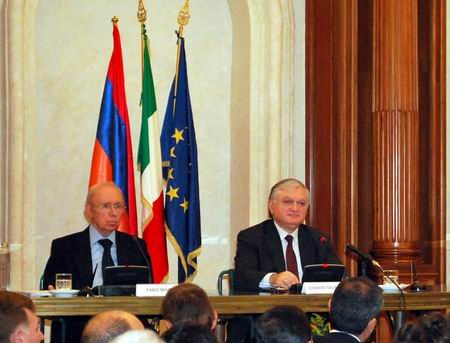
Minister Nalbandian and Archbishop Mamberti had detailed talks on the issues related to the agenda of international relations, regional problems of South Caucasus, as well as the issues that should be discussed at the OSCE Ministerial Council to be held in the early December in Athens.
